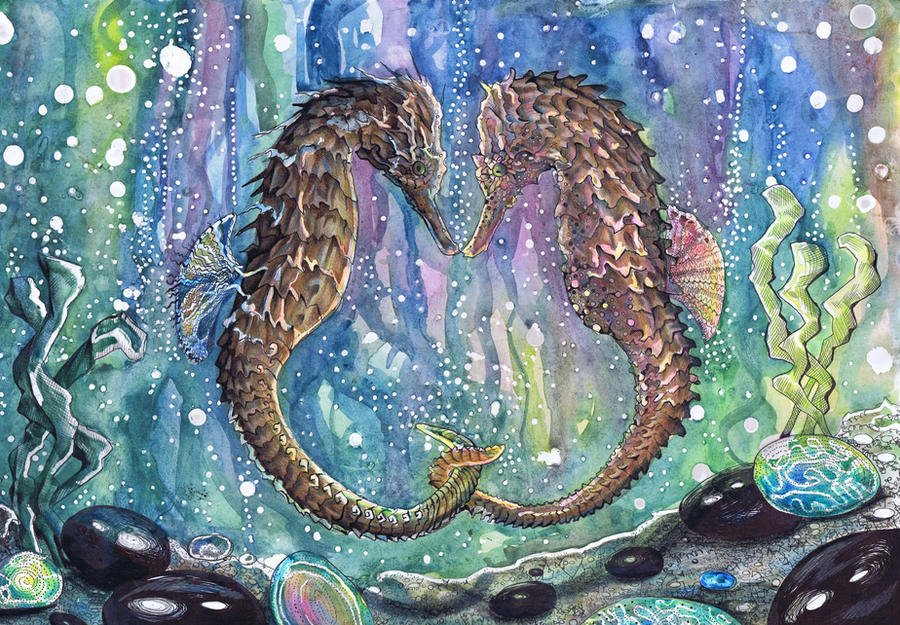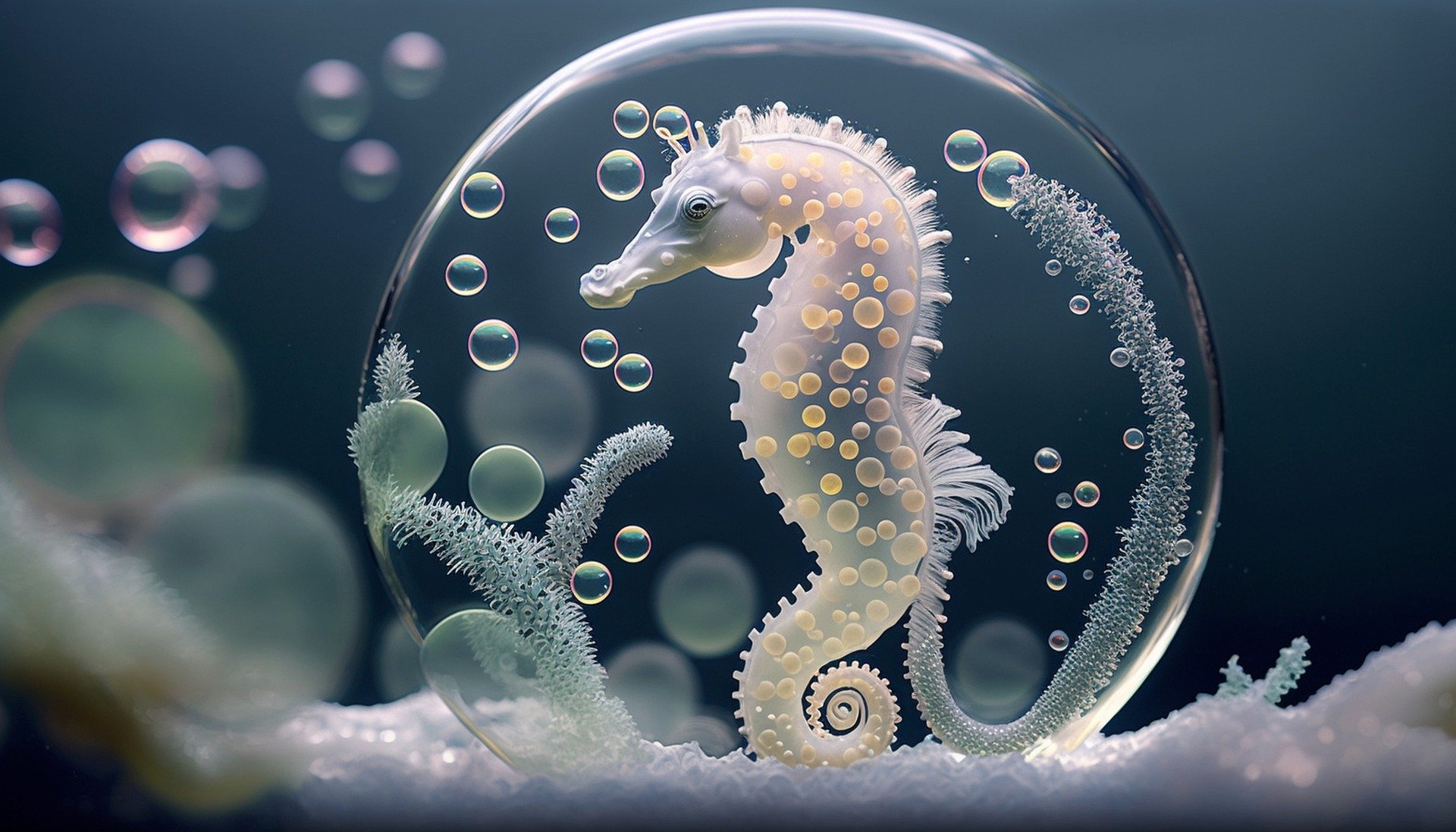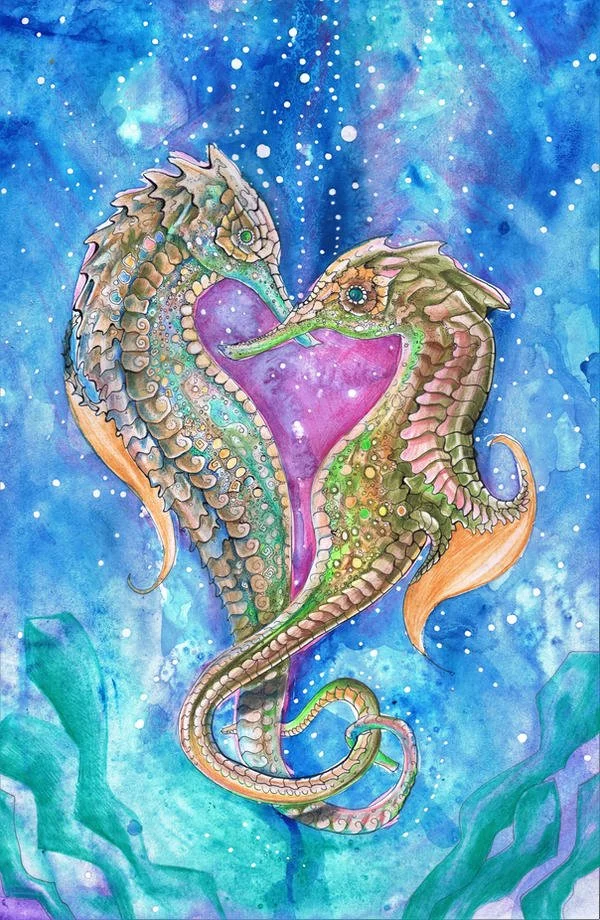Seahorse Symbolism Across Cultures: From Authority and Strength to Healing and Abundance
(Artwork by dawndelver on DeviantArt)
The seahorse, with its distinctive appearance, has become a symbol entrenched in the lore of numerous cultures across the globe. Myths and fables featuring creatures resembling this remarkable creature leave us spellbound and mesmerized by these wondrous beings' undeniable beauty and singular character.
Seahorse Symbolism in Ancient Greece
Poseidon's Chariot: Power, Authority, and Strength
In the eyes of the ancient Greeks, the seahorse held a special place as the steadfast companion of Poseidon, the god of the sea, earthquakes, and horses. So esteemed were these creatures that Poseidon himself traveled in a chariot pulled by the strong and noble seahorses, their heads bearing a striking resemblance to those of horses and their tails adorned with the flowing fins of a fish. Thus, seahorses embody the essence of power, authority, and strength. For over two millennia, the image of Poseidon's seahorses has been immortalized in countless works of art, including paintings, mosaics, sculptures, and other art forms.
Water Creatures: Emotion, Intuition, and Psychic Gifts
(Image from Pixabay)
As creatures of the water, seahorses also held deep symbolic significance for the ancient Greeks as emblems of emotion and intuition. They were believed to guide drowning sailors on their journey to the underworld, earning them the reputation of being a good luck charm among seafarers throughout the ages. In addition, like many other sea creatures, seahorses were seen as symbols of mysticism and psychic gifts, as their presence in the water signified a journey into the unconscious or subconscious mind.
Interestingly, the Greek word for seahorse, hippocampus, translates to "horse sea monster," evoking our brains' memory and learning center, the hippocampus. Thus, the seahorse remains an enduring symbol of the sea's power and mystery and the depths of our minds.
Seahorse Symbolism in Celtic Mythology
The Lure of the Kelpie
(Art by IrenHorrors on DeviantArt)
In Celtic tradition, the seahorse is also revered as a brave and determined guide of the sea. Mythical horses, known as kelpies, are also a part of Celtic folklore. These creatures emerge from rivers and lakes as ordinary horses on land. However, Kelpies are dangerous shapeshifters that can live on land and water. They are known for luring innocent people to ride on their backs, only to drag and devour them underwater.
Moreover, the Picts, a Celtic-speaking group who lived in northern Scotland during the Iron Age and early medieval era, depicted kelpies in their art. Interestingly, their portrayals of these mythical creatures are similar in appearance to the ancient Roman depictions of hippocampi.
Seahorse Symbolism in Ancient China and Japan
Water dragons: Formidable yet Gentle, Healing and Abundance
In Chinese culture, the seahorse was revered as an aquatic monster, often depicted as a miniature dragon of the sea. Like their counterparts in ancient Greece, seahorses held great significance in China as symbols of power. They were also associated with good fortune and unwavering strength in adversity.
Moreover, the seahorse is revered as a mythical creature and admired for its gentle yet formidable strength and assured spirit. Emblematically, seahorses are associated with security, perspective, and forbearance. They are often referred to as "water dragons" and held in similar regard as their legendary counterparts.
According to Chinese belief, the essence of seahorses relates to the liver and kidneys and can be used to reinstate balance in the body. Additionally, seahorses are used in traditional Chinese medicine. Due to their perceived therapeutic qualities, they are also regarded as symbols of good health, robustness, and overall prosperity.
Similarly, in Japanese, seahorses are called "tatsu-no-otoshigo," meaning "dragon's illegitimate child." This association with dragons is significant in Asian cultures, where dragons are revered for their godlike qualities. In addition, seahorses are viewed as symbols of good fortune, healing, and abundance in Japan and other parts of Asia.
Unfortunately, the belief in the supposed special powers of seahorses has led to their use in traditional Asian medicine, even though there is little evidence to support the idea that consuming seahorses has any therapeutic benefits.
Seahorse Symbolism: Fatherhood, Perception, and Determination
(Artwork by dawndelver on DeviantArt)
The seahorse is a remarkable creature with distinct and powerful symbolism, particularly regarding the male aspect and the significance of fatherhood. In nature, male Seahorses take on a substantial role by carrying the female's eggs in their tail pouch for roughly one and a half months until they are ready to be born. This highlights an extraordinary partnership between the male and female of the species, with many known to remain monogamous for life.
In addition to this, the seahorse's unique physical characteristics provide it with numerous other symbolic values. For example, its eyes can move independently, granting it a heightened awareness and perception of its surroundings. Furthermore, the seahorse's bony exterior is a protective shield, providing a secure and safe refuge for its delicate form.
Finally, despite not being the strongest swimmers, Seahorses move slowly and steadily from place to place, using their tails as anchors in turbulent waters. This trait serves as a symbol of resilience, calmness, and determination.
Inviting the Seahorse Within
With their unique and mysterious nature, seahorses have captured people's imaginations across cultures and time. Their symbolic significance in various cultures is a testament to their powerful presence in the spiritual realm. The attributes that seahorses are associated with - good luck, fortune, strength, power, and courage - are qualities that we could all benefit from in our lives.
Inviting the seahorse symbolism into our lives can be a way to connect with these attributes and embrace them. Whether incorporating seahorse imagery in your surroundings or seeking out the energy of seahorses in your meditative practice, inviting the symbolism of these fascinating creatures can bring positive energy and inspiration to your life.
What personal meaning do you attach to the symbolism of the seahorse?
Have you ever experienced the mystical presence of seahorses in your life?
Have you encountered the seahorse in your dreams, and if so, what message might it be trying to convey?
Take a moment to contemplate the essence of the seahorse and come up with a few descriptive words that capture its unique qualities. Perhaps these words will give you a deeper understanding of the significance of their visit and the message they are attempting to impart.
Warmly,
Anny
(Artwork by dawndelver on DeviantArt)






